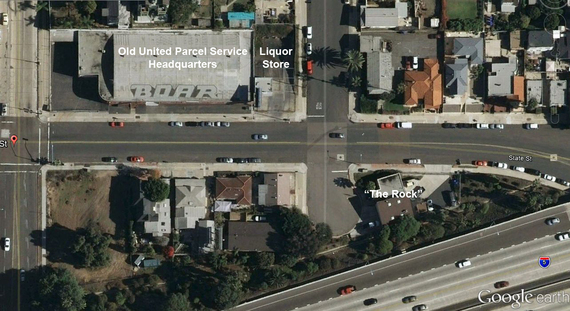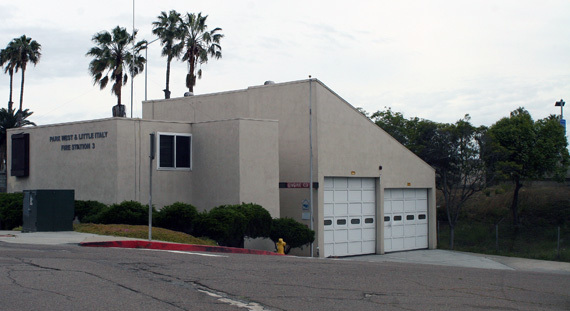We have to leave "The Rock."
And I don't mean leaving earth, although that might be a solution if it were possible.
"The Rock" we have to leave is a metaphorical one, but real none-the-less.
While attending college I was a car washer and part-time driver for United Parcel Service in San Diego. Part of my job required walking one-block to a cul-de-sac to retrieve the trucks where the drivers had left them.

The old UPS building and location of the liquor store and "The Rock" on the cul-de-sac. Image courtesy Google Earth
While I worked, the drivers bought beer at the liquor store next to the UPS building then crossed the street to drink in the empty lot next to the cul-de-sac before heading home. An immense boulder taller than a large man made the empty lot an attractive place to gather. We called it "The Rock."
"If we don't rapidly adopt a clean energy economy, what will future generations think when they learn we didn't have the will to leave "The Rock" and they are suffering as a result?"
I would listen to drivers at the "The Rock" talking about sports, their newest mobile home, boat, motorcycle or pickup truck, and the vacations where they had used those toys. I could have concluded that being a UPS driver was a desirable end goal for me. Drivers were rumored to regularly be worth $1 million dollars upon retirement (and this was in the 1970s). We were all members of the Teamsters Union, guaranteed a salary, health care, and retirement options maintaining financial security until death. I had already been used as seasonal and substitute driver, trained to step into a permanent role when ready. How could there be more?
I appreciate the hard work UPS drivers do. I am glad when drivers bring me packages and that they are fairly-compensated union members. UPS was a good company that gave me the opportunity to work my way through college without amassing debt.
Leaving UPS would mean leaving the financial security of what that company provided in favor of seeking an uncertain future that might be better. I wanted to be a writer, to travel the world, to understand different perspectives, for every day to present new challenges.
I left the certain security symbolized by "The Rock" for the uncertainty of creating a different kind of life.
"If we don't leave "The Rock" voluntarily, another rock will come crashing down on us."
Depending on fossil fuel energy is "The Rock" all of us must leave. The challenge is to transition to clean energy and at the same time maintain economic security for those who already have it and expand economic security to those who don't.
If we don't leave "The Rock" voluntarily, another rock will come crashing down on us. The climate crisis could literally change the face of the planet and economic security as we know it, stripping away our expectations of normality in ways we might not think possible. Here's how:
- The productivity of developed agricultural lands might be reduced, even in the U.S., driving the cost of food upward due to shortages and creating famines in parts of the world hardest hit.
Imported foods might no longer be as plentiful and available because of changes in precipitation patterns, extended droughts, and loss of agricultural lands. As a result, the fresh fruit, vegetables, fish, poultry, meat, and other foods we expect to always be available, no matter what the season, often transported by air, might not be in the supermarket. Changes to the acidity of the ocean might alter the marine ecosystem in substantial ways, further harming over-harvested species, reducing a global source of protein, and making rare some of our favorite seafood dishes. The places we love to visit might soon be too warm to enjoy, be under water, or be politically unstable. Drought, sea level rise, adverse air temperature and extreme weather events will displace people from homes and even nations, changing the very places we live, even in the U.S. (NOTE: We have already seen this in Syria, but have chosen to ignore it, attributing the civil war there only to political unrest. However, a multi-year drought that began in 2006 changed Syria from a net exporter of wheat to an importer and forced more than one million people from farms into the cities. Without jobs and lacking skills to transfer to other lines of work, Syrian men have become easy targets for ISIS and other rebels who promised them a return to some of the economic security they had previously enjoyed. The radical Islamic forces recruited them, but the men were more open to recruitment because they had lost their secure lives in part due to drought, likely related to climate change.) Syria is only one example of how people will lose their sense of economic security because of climate change, forcing large numbers of people to relocate. As with Syrian refugees, this will create challenges wherever they try to move. When regions become politically unstable, countries with the most stable economies and political structures are likely to step in to maintain order. This will cost money and lives and create political challenges. Even though many are turning a blind eye to the understanding that political instability could be created by climate change, military leaders all over the world are preparing for it while also leading the way in determining how to transition to the use of sustainable and secure sources of clean energy rather than fossil fuels."Leaving "The Rock" doesn't have to be a story of doom and gloom; it should be a story of creating better places, both locally and globally."
Leaving "The Rock" doesn't have to be a story of doom and gloom; it should be a story of creating better places, both locally and globally. A clean energy world could be a more secure one both economically and environmentally. According to a March 2016 report by the non-partisan business group Environmental Entrepreneurs (E2), more than 2.5 million jobs in the U.S. are already attributable to clean energy. We don't have to abandon the lifestyles we enjoy. We don't have to lose the benefits a fossil-fuel-based society has provided us unless we refuse to transition to a new security based on renewable, clean energy sources.
As an aside, UPS moved to a bigger, better place where the firm's economic security was more assured. Where "The Rock" once stood is a fire station, fittingly a symbol of crisis response rather than security. Fitting because the crisis we face on the planet requires rapid response to address the threat of climate change caused by fossil fuels.

The cul-de-sac now with a fire station where "The Rock" once stood.
Image courtesy the author.
There is no doubt we have to leave "The Rock" by choice and transition to a clean energy reality. Two questions remain:
- How can we most rapidly leave "The Rock" and implement a new model for economic security based on clean energy?
Support HuffPost
Our 2024 Coverage Needs You
Your Loyalty Means The World To Us
At HuffPost, we believe that everyone needs high-quality journalism, but we understand that not everyone can afford to pay for expensive news subscriptions. That is why we are committed to providing deeply reported, carefully fact-checked news that is freely accessible to everyone.
Whether you come to HuffPost for updates on the 2024 presidential race, hard-hitting investigations into critical issues facing our country today, or trending stories that make you laugh, we appreciate you. The truth is, news costs money to produce, and we are proud that we have never put our stories behind an expensive paywall.
Would you join us to help keep our stories free for all? Your contribution of as little as $2 will go a long way.
Can't afford to donate? Support HuffPost by creating a free account and log in while you read.
As Americans head to the polls in 2024, the very future of our country is at stake. At HuffPost, we believe that a free press is critical to creating well-informed voters. That's why our journalism is free for everyone, even though other newsrooms retreat behind expensive paywalls.
Our journalists will continue to cover the twists and turns during this historic presidential election. With your help, we'll bring you hard-hitting investigations, well-researched analysis and timely takes you can't find elsewhere. Reporting in this current political climate is a responsibility we do not take lightly, and we thank you for your support.
Contribute as little as $2 to keep our news free for all.
Can't afford to donate? Support HuffPost by creating a free account and log in while you read.
Dear HuffPost Reader
Thank you for your past contribution to HuffPost. We are sincerely grateful for readers like you who help us ensure that we can keep our journalism free for everyone.
The stakes are high this year, and our 2024 coverage could use continued support. Would you consider becoming a regular HuffPost contributor?
Dear HuffPost Reader
Thank you for your past contribution to HuffPost. We are sincerely grateful for readers like you who help us ensure that we can keep our journalism free for everyone.
The stakes are high this year, and our 2024 coverage could use continued support. If circumstances have changed since you last contributed, we hope you’ll consider contributing to HuffPost once more.
Already contributed? Log in to hide these messages.



